Exploring Pelagic Biodiversity of the Gulf of Alaska and the Impact of Its Seamounts
Meet the Explorers

Russell Hopcroft
Principal Investigator/Professor, University of Alaska Fairbanks
Russell (Russ) Hopcroft is chair and professor of oceanography at the University of Alaska Fairbanks. He grew up fascinated by aquatic life (and Jacques Cousteau specials), pursuing the sciences during his education. Russ received his master’s degree in 1988 and his doctorate in 1997 from the University of Guelph in Canada. The focus of his graduate research was on marine plankton ecology in the waters surrounding Jamaica, West Indies. From 1997 to 1999, he was a postdoctoral fellow at the Monterey Bay Aquarium Research Institute (MBARI), where he was heavily involved in the use of remotely operated vehicles, as well as traditional oceanographic surveys, to study the oceans. In 2000, he joined the University of Alaska Fairbanks in 2000 where he focuses on Arctic and subarctic ecosystems. He’s currently the lead investigator for the Northern Gulf of Alaska Long-Term Ecological Research (NGA-LTER) program that maintains the 25-year-long time-series of the Seward line (a series of sampling stations).
Russ pursues a broad array of research interests, concentrating on the “lower” planktonic trophic levels that ultimately shape the structure of all marine communities. His research focuses on the composition, production, and energy flow of pelagic ecosystems and better methods to explore these topics. With 150 scientific publications, he is a leading expert on Arctic and subarctic zooplankton biodiversity, with broad expertise across all taxonomic groups. Although much of his research focuses on the abundant copepod crustaceans, he is also a specialist on the taxonomy, biology, and ecology of the pelagic tunicates.
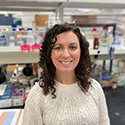
Jennifer Questel
Co-Principal Investigator/Research Assistant Professor, University of Alaska Fairbanks
Jennifer (Jenn) Questel is a research assistant professor at the College of Fisheries and Ocean Sciences, University of Alaska Fairbanks (UAF). She is a biological oceanographer who specializes in the zooplankton and molecular ecology of polar and subpolar ecosystems. Her research takes her from the Arctic Ocean to breathtaking mountainscapes and tidewater glaciers in coastal fjord systems in southeast Alaska to seamounts and the abyssopelagic zone in the Gulf of Alaska. Jenn uses a suite of molecular techniques (e.g., DNA barcoding, population genetics, phylogeography, metabarcoding) to better understand the structure and biodiversity within zooplankton communities. One of her major career research objectives is to increase species representation in reference DNA sequence databases and has been making considerable progress in DNA barcoding deep-water zooplankton from all taxonomic groups. She is often a visiting scientist at the Smithsonian National Museum of Natural History, where she carries out much of this work. Jenn received her bachelor’s degree in zoology from the State University of New York at Oswego (2008) and her doctorate in oceanography from UAF (2016). She has held two postdoctoral appointments, the first at the University of Connecticut (Supervisor: Ann Bucklin) and the second at UAF (Supervisor: Russ Hopcroft).
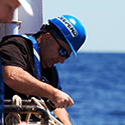
Tracey Sutton
Co-Principal Investigator/Professor, Nova Southeastern University
Tracey Sutton is a professor at the Guy Harvey Oceanographic Research Center and Halmos College of Arts and Sciences at Nova Southeastern University (NSU). He is currently the director and lead investigator of DEEPEND (Deep-Pelagic Nekton Dynamics of the Gulf of Mexico), a 120+ member research consortium formed in 2015 that has published over 100 scientific papers and graduated over 60 students with advanced degrees. Prior to that, Tracey led the Pelagic Nekton working group of the Census of Marine Life program MAR-ECO (Mid-Atlantic Ridge Ecosystem Project). He was an invited expert panelist on the United Nations First and Second World Ocean Assessments, an original steering committee member of the Deep Ocean Stewardship Initiative, and a society-elected member of the board of governors of the American Society of Ichthyologists and Herpetologists. Tracey is a recent recipient of the NSU Provost’s Research and Scholarship Award. He earned his doctorate at the College of Marine Sciences, University of South Florida, and was a postdoctoral at Woods Hole Oceanographic Institution.
Tracey’s research program centers on oceanic ecosystem structure, marine food webs, benthic-pelagic coupling, ichthyology, taxonomy, systematics, and biogeography. He is a seagoing scientist (90 expedition), who has conducted research in a wide variety of ecosystems. Currently, he has funding for projects in the Gulf of Mexico, the Mid-Atlantic Bight, the southeast Atlantic (off Africa), and the Gulf of Alaska. His research combines empirical data, numerical modeling, and theoretical ecology to understand Earth’s largest ecosystem, the deep-pelagic ocean. He has published over 140 papers to date and received over $30 million in extramural funding.
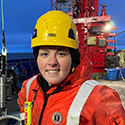
Ronnie Balice
Undergraduate Student, University of Guelph
Ronnie Balice is currently working to finish her Bachelor of Science degree in marine and freshwater biology from the University of Guelph in Canada. She was part of the zooplankton team during this expedition, helping to sample the community structure of the Gulf of Alaska. Ronnie is interested in everything to do with aquatic science, from physics to biology. This was her first research expedition and she was very excited about the learning opportunity and the chance to broaden her field experience.

Nicholas Bezio
Illustrator, University of Maryland
Nicholas Bezio is an illustrator and doctoral candidate at the University of Maryland. Originally studying hydrodynamics and its influence on the feeding efficiency of jellyfish during his undergraduate studies, he later attended California State University, Monterey Bay, to study and learn about the importance of scientific illustration. Combining his experience in the marine sciences and scientific illustration, he is working with his advisor, Allen Collins, to describe species within the taxonomically poorly understood phylum Ctenophora. Focusing specifically on the order Platyctenida and Beroida, he is using detailed morphology, genetic sequencing, and statistical models to clean up the taxonomy of these two groups. During the expedition, he helped with photographing, illustrating, and identifying the numerous gelatinous species within the water around Alaska.
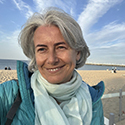
Katarzyna Blachowiak-Samolyk
Full Professor, Institute of Oceanology, Polish Academy of Sciences
Katarzyna Blachowiak-Samolyk’s main focus is on Arctic zooplankton ecology, which is complementary to her earlier Antarctic studies and extending her interests into both polar regions. She is especially interested in diel vertical migration patterns, seasonal plankton composition structure and distribution (including polar night period), trophic relationships in zooplankton itself and between zooplankton as a prey and their planktivorous predators (higher trophic levels), biodiversity, and biogeography. She is also concentrating on the use of innovative optical tools (e.g., Laser Optical Plankton Counter, Underwater Video Profiler) and linking the information obtained from these instruments with traditional plankton observations. As a taxonomic editor of SCAR Marine Biodiversity Information Network’s Register of Antarctic Marine Species, Katarzyna is involved in the taxonomy and zoogeography research on pelagic Ostracoda, and this was her focus during the expedition.
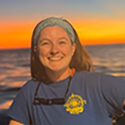
Grace Cawley
Graduate Student, Scripps Institution of Oceanography
Grace Cawley has spent her graduate career studying zooplankton ecology across the scale of crunchy to gooey. Starting with receiving a Master of Science in marine ecology from the University of San Diego, where she studied the grazing of copepods (crunchy) on marine snow. As a doctoral student at Scripps Institution of Oceanography in the Décima Lab, Grace is currently working on understanding pyrosome (gooey) ecology in the Southern California current. She is also interested in the distribution of zooplankton and how this has changed over time and with climate change! During this expedition, Grace helped with zooplankton collection and In-Situ Ichthyoplankton Imaging System Deep-Focus Particle Imager (ISIIS-DPI) deployments. Outside of the zoop soup, Grace loves to cook, knit, run around San Diego, and is learning to surf (for the last eight years)! She was excited about this opportunity to explore a new ecosystem and learn from other zooplankton researchers aboard.
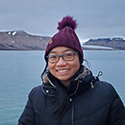
Emily Chen
Graduate Student, Institute of Oceanology, Polish Academy of Sciences
Born and raised in New Jersey, Emily Chen attended a marine science high school affiliated with the U.S. Navy and NOAA, sparking an early interest in the field. Emily received her bachelor’s degrees in marine biology, Spanish, and linguistics at Rutgers University. She also holds a master’s degree from the International Master of Science in Marine Biological Resources (IMBRSea), a joint program organized by 11 European universities across 8 countries. Emily conducted her master’s thesis in Ireland, applying eDNA to manage invasive species in shellfish aquaculture. Her varied interests have taken her from digitizing collections at the Natural History Museum in London to a Fulbright year in Taiwan to being a high school teacher of marine biology and Spanish. Emily is currently pursuing her doctorate on polar ostracods at the Institute of Oceanology, Polish Academy of Sciences. During this expedition, Emily provided taxonomic help on pelagic ostracods to better understand this understudied zooplankton group.

Allen Collins
Director/Research Zoologist, NOAA Fisheries’ National Systematics Laboratory and Smithsonian National Museum of Natural History
Allen Collins is the director of and a research zoologist with NOAA Fisheries National Systematics Laboratory, which is embedded within the Smithsonian National Museum of Natural History. He serves as the curator of the U.S. national collections of Medusozoa, Ctenophora, and Porifera. After receiving a bachelor’s degree in mathematics and economics from Amherst College in 1987, he worked for four years as a research economist, before turning toward biology and eventually completing his doctorate at the University of California Berkeley in 1999. He, and the young scientists he is fortunate to mentor, studies the biodiversity of Medusozoa, Ctenophora, and Porifera and is actively engaged in morphologically and genetically characterizing species within these groups to facilitate additional research.
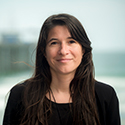
Moira Décima
Assistant Professor/Curator of the Pelagic Invertebrate Collection, Scripps Institution of Oceanography
Moira Décima is an assistant professor at Scripps Institution of Oceanography and the curator of its Pelagic Invertebrate Collection. She combines fieldwork on global class vessels, samples from collections, and experimental manipulations, to answer fundamental questions about plankton food-web structure and function, species distributions and diversity, and the role of zooplankton in biogeochemical cycling. She uses a variety of methods that include traditional sampling, live experiments, and biochemical approaches to assess variability in zooplankton trophic structure across space and time, within a broader context of ecosystem response to climate change. Her research includes using compound-specific isotope analysis of amino acids to assess the importance of the microzooplankton-mesozooplankton link to the broader pelagic food web; quantifying energy transfer through both auto- and hetero- trophic pathways; assessing the role of gelatinous zooplankton in food webs and biogeochemistry; investigating the effect of ocean acidification and hypoxia on thecosome pteropods; investigating the impact of wildfires on marine pelagic communities; applying DNA metabarcoding to investigate zooplankton community structure; and investigating ecosystem change in the California Current Ecosystem (CCE) using Scripp’s Pelagic Invertebrate Collection. Her current sea-going program is conducted within the CCE Long Term Ecological Research Program (CCE-LTER).

John Horne
Professor, University of Washington; Executive Director, Cooperative Institute for Climate, Ocean, and Ecosystem Studies
John Horne is a professor at the University of Washington’s School of Aquatic and Fishery Sciences and executive director of the Cooperative Institute for Climate, Ocean, and Ecosystem Studies. Current research interests include quantifying spatial and temporal dynamics of pelagic animals relative to their environment, application of active acoustics and related technologies to quantify effects of animal distributions and interactions on ecosystem structure and function, and the development of data acquisition and analytic tools for census and ecological surveys in support of resource management, ocean observing, and marine renewable energy environmental monitoring. John received his bachelor’s and master’s degrees from Dalhousie University in Nova Scotia and his doctorate from Memorial University of Newfoundland (both in Canada).
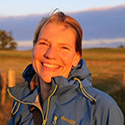
Cornelia Jaspers
Senior Scientist, Technical University of Denmark
Cornelia Jaspers is a biological oceanographer by training and has extensive experience working at sea and conducting in situ experiments with gelatinous and classical zooplankton components from tropical to arctic waters. She has worked experimentally with gelatinous zooplankton at laboratories around the world and kept different jellyfish, comb jelly, and larvaceans in the laboratory for experiments testing their response to global change pressures and jellyfish — fish interactions. Currently, Cornelia is leader of the Centre for Gelatinous Plankton Ecology & Evolution at the Technical University of Denmark in Copenhagen.
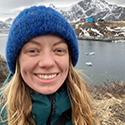
Camilla Juul Dahl Jensen
Graduate Student, Technical University of Denmark
Camilla is from Esbjerg, Denmark, but lives in Copenhagen, Denmark, where she is studying for a master’s degree in ocean engineering, specializing in oceanography, at the Technical University of Denmark, from where she has a bachelor’s degree in biomedical engineering. Her research interest centers on biodiversity and the mechanisms within ecosystems, exploring how functional traits of organisms are distributed with environmental parameters during climate change and/or environmental gradients. Camilla has experience with research expeditions, both deep- and coastal ocean, from working on stock assessment surveys in Greenland. She loves recreational sailing and has accumulated over 5,000 nautical miles (5,754 miles) across the ocean. During this expedition, she was part of the zooplankton team.
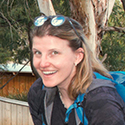
Hannah Kepner
Graduate Student, University of Alaska Fairbanks
Hannah received a bachelor’s degree in biology from the University of Georgia before moving to the University of Alaska Fairbanks, where she is currently pursuing a master’s in biological oceanography. During research expeditions in the Northern Gulf of Alaska, she deploys the In-Situ Ichthyoplankton Imaging System Deep-Focus Particle Imager (ISIIS-DPI), a remotely operated towed vehicle equipped with an imaging array and other instrumentation to collect zooplankton images and environmental data. Her current research leverages in situ imaging and machine learning to describe the fine-scale spatial structuring of gelatinous zooplankton communities. When she’s not at sea or behind her laptop, Hannah spends her time SCUBA diving, climbing, and skiing. During this expedition, Hannah deployed the ISIIS-DPI to characterize the zooplankton communities and oceanographic properties associated with seamounts in the Gulf of Alaska.

Dhugal Lindsay
Senior Staff Scientist, Japan Agency for Marine-Earth Science and Technology
Dhugal Lindsay is an Australian working in Japan at the Japan Agency for Marine-Earth Science and Technology (JAMSTEC) and several universities. His research focuses on midwater ecology, particularly concentrating on gelatinous organisms that are too fragile to be sampled by conventional methods. He is also heavily involved in developing technologies to study these organisms in situ. Dhugal has taken part in surveys around the Arctic and Antarctic; in the Sargasso Sea, Challenger Deep, southeast Pacific, Mediterranean sea, Coral Sea; off southeast Asia; and at hydrothermal vents and elsewhere, collecting DNA barcodes, voucher specimens, and ecological information on species to characterize their realized and potential niches, revise their taxonomy, and provide an expert-vetted molecular toolkit for future studies on the life histories and feeding ecology of this extremely important fraction of the deep biosphere. He also likes writing haiku poetry and playing beach volleyball.
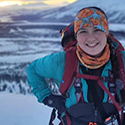
Alexandra Poje
Research Staff Member, University of Alaska Fairbanks
Alexandra (Alex) Poje is a research staff member at the University of Alaska Fairbanks (UAF) in the zooplankton group. She moved to Fairbanks in 2017 to pursue a master’s degree in oceanography, investigating copepod growth rates in the Bering and Chukchi seas. After graduating, she worked as a ski patroller in the Fairbanks area before returning to UAF as staff. She now processes community samples from the Gulf of Alaska and other locations around Alaska and participates in research expeditions, like this one. Outside of the zooplankton world, she enjoys skiing with her dogs and getting out of cell service as much as possible.

Nina Pruzinsky
Grant Science Support Coordinator/NOAA Ocean Exploration Representative, NOAA Ocean Exploration (UCAR)
Nina Pruzinsky is a grant science support coordinator for NOAA Ocean Exploration. She provides technical and science support to the competitive grant program the NOAA Ocean Exploration Cooperative Institute. Nina received her Bachelor of Science in environmental science with minors in marine science and Spanish from the University of Delaware and her Master of Science in marine biology from Nova Southeastern University (NSU). Her master’s thesis focused on the identification, faunal composition, and spatiotemporal distributions of late-larval and juvenile tuna in the Gulf of Mexico. While working at NSU from 2015-2023, she led project and database management for several multi-institutional and multidisciplinary research programs that focused on deep-sea research (the NOAA-supported Offshore Nekton Sampling and Analysis Program and the Deep-Pelagic Nekton Dynamics of the Gulf of Mexico consortium), genomics/photosymbiotic organismal research (the Aquatic Symbiosis Genomics Project), genetics/shark tagging research (the Guy Harvey Research Institute and the Save Our Seas Foundation–Shark Research Center), and coral aging/growth research (Stony Coral Lab). Nina has also led the planning and logistical preparations for several deep-ocean and ichthyoplankton expeditions and participated in four expeditions in the Gulf of Mexico and Atlantic Ocean. As the representative for NOAA Ocean Exploration on this cruise, Nina provided data and communication support while at sea.
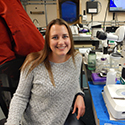
Caitlin Smoot
Research Professional, University of Alaska Fairbanks
Caitlin Smoot is research staff in the College of Fisheries and Ocean Sciences at the University of Alaska Fairbanks and has been studying zooplankton in Alaskan waters since 2012. Her interest in invertebrates began when she worked in a marine ecology lab at Virginia Institute of Marine Science while completing her undergraduate degree at the College of William and Mary. As an undergrad, she had the opportunity to participate in a research expedition to the Antarctic and became interested in zooplankton. After earning her Bachelor of Science in biology, she worked with micro- and meso-zooplankton in Lake Michigan before moving to Alaska. She completed her Master of Science in marine biology at the University of Alaska Fairbanks, where she studied epipelagic and mesopelagic zooplankton communities in the Beaufort Sea. After her degree completion, she transitioned to a research staff position at the University of Alaska Fairbanks, where she continues to study zooplankton in the Pacific-Arctic region. Caitlin has participated in several deep-ocean expeditions and is interested in the taxonomy and ecology of marine copepods.
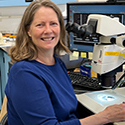
Elizabeth Stockmar
Research Professional, University of Alaska Fairbanks
Elizabeth grew up in Connecticut and received her Bachelor of Science in biology from the University of Connecticut in 1984. There, she fell in love with invertebrates in a zoology class. After graduation, she moved to Houston, Texas, and worked as a technician at the University of Texas Health Science Center. It was too hot in Texas, so Elizabeth headed north, and studied R. Ted Cooney and Ken Coyle at the University of Alaska Fairbanks. In 1994, she received her Master of Science in marine biology. She participated in five research expeditions in the Gulf of Alaska from Seward out to Ocean Station Papa for her research on the diel and seasonal variability of micronekton and macrozooplankton. Elizabeth has worked in the Marine Biology Lab at the University of Alaska Fairbanks since 1989.
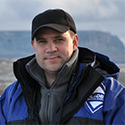
Marcin Wichorowski
Chief Technology Officer, Institute of Oceanology, Polish Academy of Sciences
Marcin Wichorowski is currently the chief technology officer at the Institute of Oceanology, Polish Academy of Sciences, and the Polish Representative for the International Oceanographic Data and Information Exchange of UNESCO’s Intergovernmental Oceanographic Commission. He’s an ocean data expert and an active participant in the international ocean data community through the International Council for the Exploration of the Sea, Baltic Operational Oceanographic System, European Global Ocean Observing System, and Svalbard Integrated Arctic Earth Observing System initiatives. Marcin has organized several international scientific conferences and facilitated workshops and sessions on ocean data management and curation. He is a data engineer and project manager with a broad portfolio of successful projects developed in oceanographic data-related areas like research infrastructures and ocean data and information systems.